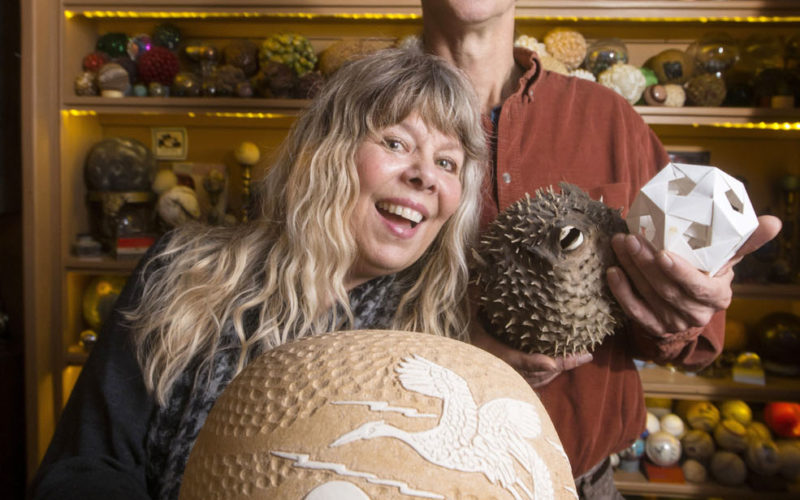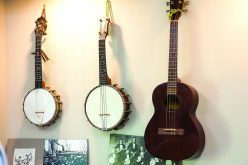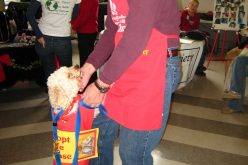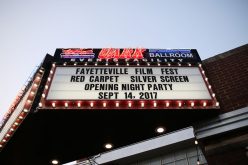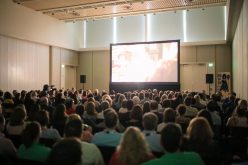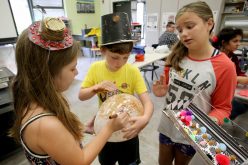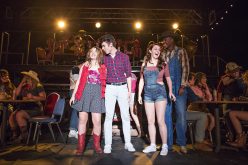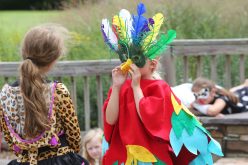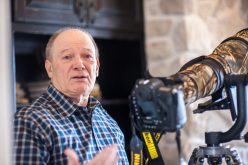Donna and Kelly Mulhollan tell Arkansas stories in song
LARA JO HIGHTOWER
lhightower@nwadg.com

The Free Weekly/BEN GOFF@NWABENGOFF
“They are a really good example of right livelihood — if you do what you love with all of your heart, all of your effort and energy won’t go to waste. They live their values in so many ways.” — Jan VanSchuyver
There are few people that appreciate the lush landscapes, quirky history and eccentric characters of the Ozarks more than Kelly and Donna Mulhollan. The music they have created as the popular singing group Still on the Hill has celebrated the wonders of this region since 1994. For the past decade, though, that focus became laser-sharp when they were commissioned by Jones Television — a nonprofit, community television station affiliated with the Jones Center in Springdale — to create a CD called “Ozark: A Celebration in Song.” Since then, the Mullhollans have produced three more Ozark-centric CDs that cover beloved territory: Beaver Lake, the Buffalo River and historic Cane Hill.
“We were falling in love with the eccentrics of the Ozarks,” says Kelly. “People who make fiddles out in the middle of nowhere or the mug tree lady, who has thousands of mugs hanging from the tree in her front yard. We have found that these stories resonate so strongly with people, and we realized that there was a vacuum. Appalachia, for instance, is thoroughly documented. In Arkansas, in Missouri, it’s almost untrodden. People love to hear about the Ozarks. They love where they live, and nobody’s singing their songs.”
“Donna and Kelly have such a huge world outside of their music, in terms of loving the community and the people in it,” notes friend and neighbor Nan Yarnell, who points out that they are both involved in a number of community organizations like the Botanical Garden of the Ozarks, the Arkansas Audubon Society’s Halberg Ecology Camp, the Omni Center for Peace, Justice and Ecology and the Ozark Chinquapin Society. “Donna and Kelly have time for everyone. Their arms are continually open.”
Always Music
The couple speaks in the living room of their home in Fayetteville, also known as the Ozark Ball Museum, so named because of the some-2,000 spherical objects displayed on tall wooden shelves built by Kelly. Kelly started his collection as an adolescent, and the two have kept it up over the years, scouring thrift stores and garage sales for museum-worthy balls. There are billiard balls, smooth, stone balls, a fuzzy sphere made out of a friend’s cat’s hair — even a heavy iron ball and chain from Alcatraz, a gift from Donna’s sister. The effect is zany and happy and a party for the eyes. Their “museum” was featured in 2011 in American Profile, a magazine insert included in newspapers nationwide, which served to cement the Mulhollans’ home as one of those Ozark curiosities that they love so much.
The couple have been together for 23 years, after meeting at a recording session in the early 1990s in Fayetteville. Though they had drastically different backgrounds, it didn’t take them long to realize that their skills and talents complemented each other.
Donna is a self-taught musician who learned to play a fiddle by ear at the age of 12 so she could accompany her artist-musician father, Smitty, when he played the old country music that he loved so much.
“We traveled around the country, with him playing music and painting signs,” she says. “I had a really colorful childhood.”
“I have tapes of their family playing together,” says Kelly. “The kids, everybody was involved. They sang as a family and in a way that’s just almost disappeared.”
When her beloved father died young, of a heart attack, he was traveling the country with Donna’s mother in a motor home he had decorated himself.
“He painted the whole mobile home like a circus wagon,” she says. “On one side, there was a picture of a big monster with a tongue that went clear across the motor home with a scientist with a hypodermic needle. But on the other side of the motor home was a picture of their motorhome, going down a country road, and there was a little road sign that said ‘Ringgold, Georgia’ and a ‘76 truck stop, that orange ball sign. He never finished it, and he died 10 years after that at a ‘76 truck stop in Ringgold, Georgia.
“My sister and I flew into Chattanooga, and we were walking around [the motor home],” she continues. “We’d never noticed the details before. We buried him in a cemetery right across from that truck stop. He was very special. Never met a stranger.”
Donna had been a traveling musician since the age of 18 when, in her mid-20s, her then-husband suggested they move back to his hometown of Fayetteville. She had only lived in large, urban environments prior to that time — Buffalo, Las Vegas, San Francisco, Minneapolis — but she decided to give life in a small Southern town a try.
She knew almost immediately that it was a perfect fit.
“This is the only place I ever put down roots,” she says. “It’s my home. I never want to live anywhere else. One of the main things we do now is write songs about people in the Ozarks, and I feel valid in doing that because I just feel like my roots have gone down deep here.”
Kelly, on the other hand, is a fifth-generation native of Fayetteville, where he grew up on Prospect Street, right across from Wilson Park. His father was an academic and worked for the University of Arkansas. Kelly fell in love with music when he was given a ukelele at around 8 years old. His parents, he says, were “perplexed” by his fervent passion for music, but they supported it and suggested he take classical guitar lessons.
“I’m so very thankful for that, because it gave me a solid foundation of knowing how to read music,” he says. “It gave me more technical ability than a lot of people have. It gave me some discipline, and I started falling in love with classical music.”
His father had left teaching for administration and started moving further and further up the ladder — and the family moved with him, from university to university. Given his father’s career, it was simply assumed that Kelly would go to college, but it was not a good fit. He dropped out just a few classes away from graduation.
“I’d become a little bit disillusioned with academia in general. I became very politically motivated. I was inspired by people like Woody Guthrie and Pete Seeger, and I was very politically active in opposing various war behaviors of the United States at the time. So I got involved in activism, and my music was very much about activism for quite a long time.”
He had moved far away from Fayetteville at this point but, like Donna, he started feeling a yearning to find a home.
“I was feeling rootless, as if I was drifting,” he says. “And for some reason I had this natural need to reclaim my roots, to go discover where I came from. It’s also the nature here that pulls me back — the seasons, the landscape, the animals, everything. It’s all very close to me.”
Perfect Pair
When they met, Kelly was playing with some of the biggest acts of the day — Jed Clampett, Crow Johnson and Clark Buehling and the Skirt Lifters —but he longed to start his own band. Donna was in her ninth year of playing honky tonk five nights a week, six hours a night in a band called Backstage Pass at Club West.
“It was a good living, but I was getting kind of tired of the bars,” says Donna. “I had a child. I just needed to grow beyond where I had been my whole life.”
They were both, seemingly, in a holding pattern, waiting for something — they just didn’t know what. Everything changed that day they met in the recording studio.
“I was playing mandolin, and she was playing fiddle,” remembers Kelly. “And I was really pleased, first of all, with what she was doing. But I was also curious whether she’d ever written anything.”
“I had started writing songs,” says Donna. “In the country band, I think I played one of my songs for them, and they said, ‘Nobody knows that song. You can’t two-step to that.’ So I pushed my love of writing underground.”
“She told me that she had only written a few songs, and I said, ‘Why don’t you play one for me?’” says Kelly. “And she played a song called ‘Ode to Mr. Boze’. It was about an old fiddle player, a man from Russellville that she’d met a long time ago. And I was swept off my feet by that. It was so pure and good. To this day, we play that song.”
It was the first time someone told Donna that her songwriting was valuable.
“He came along, and I was like, ‘Really? You mean we could actually play stuff like this?’” she remembers.
“And so the floodgates opened,” Kelly says. “She is one of the most prolific songwriters I know about. We lost count a long time ago, but it’s got to be at least 800 songs she’s written. They come all the time. They come steadily. There’s never a dry spell. It’s just nonstop.”
“She’s got that freedom of not worrying about what people think,” notes Yarnell. “Her creativity just soars. ‘Perfectionism inhibits creativity’ — that’s one of the most valuable lessons she’s taught me.”
Kelly, too, is a songwriter, though, he says, he is not as prolific as Donna. His album, “Never Ending Conversation,” consists of 10 poems — including Langston Hughes’ “God to Hungry Child” and William Blake’s “The Garden of Love” — put to music that Kelly wrote.
Donna was the fiddle player Kelly had been waiting for and, in 1994, Still on the Hill was born in its first incarnation — as a quartet. Later, it was slimmed down to a duo.
“Donna and I really like to reinvent ourselves constantly, and we can do that thanks to her prolific nature,” says Kelly. “And, by the way, that’s not the typical trajectory for musicians. Most successful musicians, they write some songs that work and then they keep doing that. And that’s a very successful business model. But Donna and I have dispensed with that entirely. At least every two years — maybe every year — we have a whole new repertoire. Our audiences expect us to be playing something they haven’t heard.”
Songs About Places
When Tony Miltich, president of the Association for Beaver Lake Environment, heard “Ozark: A Celebration in Song,” he realized that the couple’s knack for putting history to music had potential for community education and engagement. These were vitally important to him in his efforts to help keep Beaver Lake from being “recklessly developed,” says Kelly.
“Little did he know that I grew up on Beaver Lake in the summers,” says Kelly. “My family had a place on Beaver Lake, and we still have a family cabin in Larue. I have a deep knowledge and love of the lake. So we got together with two other organizations, Beaver Lake Water District and Beaver Lake Watershed Alliance, and they put all of their money together and created another project.”
The Mulhollans spend up to a year researching the history of the place on which they focus so that they can write appealing and moving songs that are also historically accurate.
“The formula we’ve been using is that they pay us for a year or so to write the songs, do the research, make the CD, promote it and do 10 to 13 free concerts,” says Donna. “We give away a thousand CDs, 100 at each show. And what a joy for us as musicians to be able to give our music away.”
“Especially in rural communities, where they’re not used to having to pay $15 to go see something,” says Kelly.
They were playing to shows at full capacity and were receiving enough positive feedback that they could tell their message of celebrating and protecting the natural beauty of the Ozarks was getting through. When the Buffalo River Watershed Alliance started raising awareness of the potential danger posed by the presence of C & H Hog Farms near the banks of the river, they knew they could help.
“This time, we initiated, instead of somebody coming to us,” says Kelly. “We went to the Ozark Society, the Buffalo River Watershed Alliance and the community. We sent out emails to our circle of friends, basically, and said, ‘We have this dream — anyone want to help us?’ And they did.”
Their latest mission is to get the word out about Cane Hill, a tiny community located on Arkansas 45 about 25 miles southwest of Fayetteville. Jerry Leach, co-chairman of the Historic Cane Hill Society, says he thought maybe they would be just the duo to tell folks that this small community is a gem.
“It has just worked out really great, I think,” says Leach. “The initial kick-off concert was held in the Cane Hill College auditorium, and we had a packed house. They just relate so well to the audience. It builds a lot of enthusiasm, and I think that carries over to the people that never would have heard about historical Cane Hill. It sticks with people a lot more when they listen to a song than [to] read a couple of paragraphs.”
“They call people’s attention to these stories in a way that [makes them listen],” says friend Jan VanSchuyver. “I think it really helps to bring to life the history of the area.”
‘True Faith’
Another Ozark treasure that Kelly and Donna are in love with is folk artist Ed Stilley. Donna first heard about his work when she asked a friend about a guitar that was sitting on her mantle.
“She said, ‘There’s a man in the hills who made hundreds of these instruments and gave them to children as a mission,’” remembers Donna. “I said, ‘I’m going to get Kelly right now.’ And I brought him over, and we were both like, ‘Take us to meet him.’”
As a result, a 20-year friendship was born. Stilley told the Mulhollans his story: As a farmer in Hogscald Holler, he was out plowing his fields in 1979 when he started feeling chest pains. He desperately needed help, but he was too far from the house for anyone to hear him calling. He started praying to God, who, he says, told him he would be OK if he promised to deliver His word, to children, through music. When he recoered, Stilley started making homemade instruments. Before age robbed him of the ability, he made over 200 instruments, all carved with the same words: “True Faith, True Light, Have Faith in God.”
There is a charm in his crudely made but heartfelt creations, and the Mulhollans were entranced with his work. Kelly wrote a book about Stilley’s art called True Faith, True Light: The Devotional Art of Ed Stilley, and one of the most fascinating aspects of it are the X-rays he took of the some of Stilley’s instruments; Stilley had realized that, by putting various objects inside of them, he could alter and enhance the sounds they made.
“Inside this instrument, that’s a Right Guard aerosol deodorant can,” says Kelly, pointing to a picture in the book. “Here you can see a Coke bottle or something, and there’s a drinking glass, there’s a saw blade.”
“’To better speak the voice of the Lord’, that’s what he says,” explains Donna.
In addition to the book — published by the University of Arkansas Press — Kelly and Donna have helped spread the word about Stilley’s work through the art world. So far, Stilley’s instruments have been on display at exhibits at the Walton Arts Center, Little Rock’s Old State House Museum and, this month, at Shiloh Museum in Springdale. Donna’s song about him, “Take Me to the Other Side,” is lovely and haunting.
“He is a brilliant folk artist who desperately needed to be seen,” says Kelly. “He didn’t care one way or another, but wesaid he needed to be seen.”
This is what the Mullholans do: They make sure the rest of us know about the treasures they’ve uncovered in the Ozarks.
They’re both too modest and unassuming to realize it, but they’ve long since become Ozark treasures themselves.
__
FAQ
Still on the Hill
Upcoming Concerts
Jan. 26
Shiloh Museum
Springdale
Feb. 2
Bentonville Public Library
405 S. Main St., Bentonville
March 2
Rogers Historical Museum, 322 s. 2nd St., Rogers
__
FYI
Still on the Hill
Through Others’ Eyes
“I can’t say enough good things about what they’ve done — their research, to start with, and then putting the songs together. It just brings them to life, more so than just reading about them. The enthusiasm that they show when they’re doing a performance, it’s contagious. I’ve been to four of their concerts for Cane Hill, and you can just see the enthusiasm in the audience.” — Jerry Leach
“I just love them. The creativity that flows out of those two is not to embellish their lives, but to embellish the lives of the community.” — Nan Yarnell
“I was bringing them a newspaper article about their Cane Hill show not too long ago, and I walked up to their door, which was open, and they were both playing like mad, sitting at the kitchen table. Donna was tapping her foot, and they were singing and playing, and I stopped to watch them for the longest time. It was so joyful. They’re wonderful,whether they are in their living room or in the Walton Arts Center.” — Jan VanSchuyver

